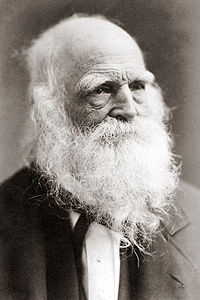Analysis of The African Chief
William Cullen Bryant 1794 (Cummington) – 1878 (New York City)
Chained in the market-place he stood,
A man of giant frame,
Amid the gathering multitude
That shrunk to hear his name--
All stern of look and strong of limb,
His dark eye on the ground:--
And silently they gazed on him,
As on a lion bound.
Vainly, but well, that chief had fought,
He was a captive now,
Yet pride, that fortune humbles not,
Was written on his brow.
The scars his dark broad bosom wore,
Showed warrior true and brave;
A prince among his tribe before,
He could not be a slave.
Then to his conqueror he spake--
'My brother is a king;
Undo this necklace from my neck,
And take this bracelet ring,
And send me where my brother reigns,
And I will fill thy hands
With store of ivory from the plains,
And gold-dust from the sands.'
'Not for thy ivory nor thy gold
Will I unbind thy chain;
That bloody hand shall never hold
The battle-spear again.
A price thy nation never gave
Shall yet be paid for thee;
For thou shalt be the Christian's slave,
In lands beyond the sea.'
Then wept the warrior chief, and bade
To shred his locks away;
And one by one, each heavy braid
Before the victor lay.
Thick were the platted locks, and long,
And closely hidden there
Shone many a wedge of gold among
The dark and crisped hair.
'Look, feast thy greedy eye with gold
Long kept for sorest need:
Take it--thou askest sums untold,
And say that I am freed.
Take it--my wife, the long, long day,
Weeps by the cocoa-tree,
And my young children leave their play,
And ask in vain for me.'
'I take thy gold--but I have made
Thy fetters fast and strong,
And ween that by the cocoa shade
Thy wife will wait thee long.'
Strong was the agony that shook
The captive's frame to hear,
And the proud meaning of his look
Was changed to mortal fear.
His heart was broken--crazed his brain:
At once his eye grew wild;
He struggled fiercely with his chain,
Whispered, and wept, and smiled;
Yet wore not long those fatal bands,
And once, at shut of day,
They drew him forth upon the sands,
The foul hyena's prey.
| Scheme | XAXABCBC XDXDEFEF XGXGHIHI JKJXFLFL MNMNOPXP JQJQNLNL MOMORXRX KSKSININ |
|---|---|
| Poetic Form | |
| Metre | 10010111 011101 01010010 111111 11110111 111101 01001111 110101 10111111 110101 11110101 110111 01111101 1100101 01011101 111101 11110011 110101 01110111 011101 01111101 011111 111100101 011101 111100111 11111 11011101 010101 01110101 111111 1111011 010101 110100101 111101 01111101 010101 1001101 010101 110011101 01011 11110111 11111 1111101 011111 11110111 110101 01110111 010111 11111111 110101 01110101 111111 11010011 01111 00110111 111101 11110111 111111 11010111 100101 11111101 011111 11110101 0111 |
| Closest metre | Iambic tetrameter |
| Characters | 1,930 |
| Words | 380 |
| Sentences | 14 |
| Stanzas | 8 |
| Stanza Lengths | 8, 8, 8, 8, 8, 8, 8, 8 |
| Lines Amount | 64 |
| Letters per line (avg) | 24 |
| Words per line (avg) | 6 |
| Letters per stanza (avg) | 191 |
| Words per stanza (avg) | 47 |
Font size:
Submitted on May 13, 2011
Modified on April 10, 2023
- 1:53 min read
- 58 Views
Citation
Use the citation below to add this poem analysis to your bibliography:
Style:MLAChicagoAPA
"The African Chief" Poetry.com. STANDS4 LLC, 2024. Web. 6 May 2024. <https://www.poetry.com/poem-analysis/40325/the-african-chief>.


Discuss this William Cullen Bryant poem analysis with the community:
Report Comment
We're doing our best to make sure our content is useful, accurate and safe.
If by any chance you spot an inappropriate comment while navigating through our website please use this form to let us know, and we'll take care of it shortly.
Attachment
You need to be logged in to favorite.
Log In